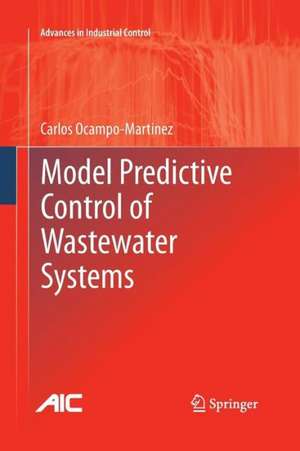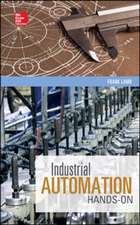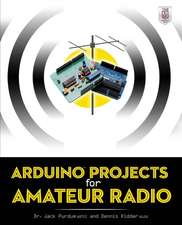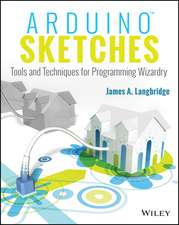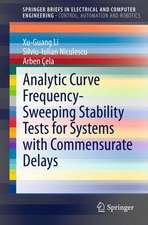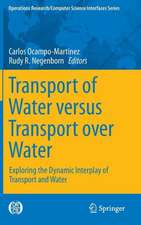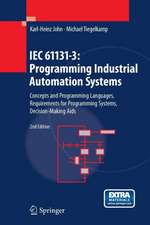Model Predictive Control of Wastewater Systems: Advances in Industrial Control
Autor Carlos Ocampo-Martinezen Limba Engleză Paperback – 4 noi 2014
| Toate formatele și edițiile | Preț | Express |
|---|---|---|
| Paperback (1) | 638.11 lei 43-57 zile | |
| SPRINGER LONDON – 4 noi 2014 | 638.11 lei 43-57 zile | |
| Hardback (1) | 642.51 lei 43-57 zile | |
| SPRINGER LONDON – 24 sep 2010 | 642.51 lei 43-57 zile |
Din seria Advances in Industrial Control
- 15%
 Preț: 643.34 lei
Preț: 643.34 lei - 23%
 Preț: 582.63 lei
Preț: 582.63 lei - 18%
 Preț: 783.98 lei
Preț: 783.98 lei - 18%
 Preț: 947.35 lei
Preț: 947.35 lei - 20%
 Preț: 568.24 lei
Preț: 568.24 lei - 15%
 Preț: 643.16 lei
Preț: 643.16 lei - 18%
 Preț: 899.21 lei
Preț: 899.21 lei - 18%
 Preț: 891.33 lei
Preț: 891.33 lei - 18%
 Preț: 740.57 lei
Preț: 740.57 lei - 18%
 Preț: 961.23 lei
Preț: 961.23 lei - 18%
 Preț: 955.08 lei
Preț: 955.08 lei - 15%
 Preț: 645.28 lei
Preț: 645.28 lei - 15%
 Preț: 638.43 lei
Preț: 638.43 lei - 18%
 Preț: 901.11 lei
Preț: 901.11 lei - 18%
 Preț: 1410.94 lei
Preț: 1410.94 lei - 18%
 Preț: 728.91 lei
Preț: 728.91 lei - 20%
 Preț: 1003.77 lei
Preț: 1003.77 lei - 18%
 Preț: 947.35 lei
Preț: 947.35 lei - 15%
 Preț: 643.34 lei
Preț: 643.34 lei - 15%
 Preț: 654.30 lei
Preț: 654.30 lei - 18%
 Preț: 950.52 lei
Preț: 950.52 lei - 15%
 Preț: 644.30 lei
Preț: 644.30 lei - 18%
 Preț: 1393.09 lei
Preț: 1393.09 lei - 18%
 Preț: 950.21 lei
Preț: 950.21 lei - 18%
 Preț: 949.90 lei
Preț: 949.90 lei - 18%
 Preț: 949.42 lei
Preț: 949.42 lei - 18%
 Preț: 950.52 lei
Preț: 950.52 lei - 18%
 Preț: 1113.71 lei
Preț: 1113.71 lei - 15%
 Preț: 650.04 lei
Preț: 650.04 lei - 15%
 Preț: 644.95 lei
Preț: 644.95 lei - 18%
 Preț: 950.33 lei
Preț: 950.33 lei - 18%
 Preț: 948.61 lei
Preț: 948.61 lei - 18%
 Preț: 1112.60 lei
Preț: 1112.60 lei - 15%
 Preț: 644.63 lei
Preț: 644.63 lei - 18%
 Preț: 953.20 lei
Preț: 953.20 lei - 18%
 Preț: 945.62 lei
Preț: 945.62 lei - 15%
 Preț: 640.88 lei
Preț: 640.88 lei - 15%
 Preț: 640.88 lei
Preț: 640.88 lei - 20%
 Preț: 650.92 lei
Preț: 650.92 lei - 18%
 Preț: 1112.60 lei
Preț: 1112.60 lei - 20%
 Preț: 998.36 lei
Preț: 998.36 lei - 15%
 Preț: 643.34 lei
Preț: 643.34 lei - 18%
 Preț: 948.92 lei
Preț: 948.92 lei - 18%
 Preț: 1381.43 lei
Preț: 1381.43 lei - 15%
 Preț: 651.51 lei
Preț: 651.51 lei - 15%
 Preț: 647.08 lei
Preț: 647.08 lei - 20%
 Preț: 563.66 lei
Preț: 563.66 lei - 18%
 Preț: 998.03 lei
Preț: 998.03 lei - 18%
 Preț: 1225.79 lei
Preț: 1225.79 lei
Preț: 638.11 lei
Preț vechi: 750.72 lei
-15% Nou
Puncte Express: 957
Preț estimativ în valută:
122.10€ • 127.81$ • 101.63£
122.10€ • 127.81$ • 101.63£
Carte tipărită la comandă
Livrare economică 31 martie-14 aprilie
Preluare comenzi: 021 569.72.76
Specificații
ISBN-13: 9781447157182
ISBN-10: 1447157184
Pagini: 248
Ilustrații: XXX, 217 p.
Dimensiuni: 155 x 235 x 13 mm
Greutate: 0.35 kg
Ediția:2010
Editura: SPRINGER LONDON
Colecția Springer
Seria Advances in Industrial Control
Locul publicării:London, United Kingdom
ISBN-10: 1447157184
Pagini: 248
Ilustrații: XXX, 217 p.
Dimensiuni: 155 x 235 x 13 mm
Greutate: 0.35 kg
Ediția:2010
Editura: SPRINGER LONDON
Colecția Springer
Seria Advances in Industrial Control
Locul publicării:London, United Kingdom
Public țintă
ResearchCuprins
Background and Case Study Modelling.- Background.- Principles of the Mathematical Modelling of Sewer Networks.- Model Predictive Control of Sewer Networks.- Formulating the Model Predictive Control Problem.- Predictive Control Problem Formulation and Hybrid Systems.- Suboptimal Hybrid Model Predictive Control.- Fault-tolerance Capabilities of Model Predictive Control.- Model Predictive Control and Fault Tolerance.- Fault-tolerance Evaluation of Actuator Fault Configurations.- Concluding Remarks.- Concluding Remarks.
Textul de pe ultima copertă
Sewer networks are large-scale systems with many variables, complex dynamics and strongly nonlinear behaviour. Their control plays a fundamental role in the management of hydrological systems related to the natural water cycle, potentially avoiding flooding and sewer overflow in extreme weather. An adequate control scheme must deal with the complicated nature of sewer networks.
Model Predictive Control of Wastewater Systems shows how sewage systems can be modelled and controlled within the framework of model predictive control (MPC). Several MPC-based strategies are proposed, accounting for the inherently complex dynamics and the multi-objective nature of the control required. The effect of system disturbance, represented by data from real rain episodes, on the performance of the control loop to which these strategies give rise is also accommodated. Complementary to these considerations is the incorporation of the closed-loop system within a fault-tolerant architecture and the study of faults in system actuators. Actuator faults are represented using hybrid modelling techniques, avoiding the loss of convexity of the related optimisation problem when the linear case is considered. The methods and control designs described in this book can easily be extrapolated to other complex systems of similar nature such as drinking-water networks and irrigation canals. A MATLAB® toolbox, created by the author and available for download from www.springer.com/ISBN will assist readers in implementing the MPC methods described within a sewer network.
Model Predictive Control of Wastewater Systems will be of interest to academic researchers working with large-scale and complex systems and studying the applications of model-predictive, hybrid and fault-tolerant control. Control engineers employed in industries associated with water management will find this book a most useful resource for suggesting improvements in the control algorithmsthey employ.
Model Predictive Control of Wastewater Systems shows how sewage systems can be modelled and controlled within the framework of model predictive control (MPC). Several MPC-based strategies are proposed, accounting for the inherently complex dynamics and the multi-objective nature of the control required. The effect of system disturbance, represented by data from real rain episodes, on the performance of the control loop to which these strategies give rise is also accommodated. Complementary to these considerations is the incorporation of the closed-loop system within a fault-tolerant architecture and the study of faults in system actuators. Actuator faults are represented using hybrid modelling techniques, avoiding the loss of convexity of the related optimisation problem when the linear case is considered. The methods and control designs described in this book can easily be extrapolated to other complex systems of similar nature such as drinking-water networks and irrigation canals. A MATLAB® toolbox, created by the author and available for download from www.springer.com/ISBN will assist readers in implementing the MPC methods described within a sewer network.
Model Predictive Control of Wastewater Systems will be of interest to academic researchers working with large-scale and complex systems and studying the applications of model-predictive, hybrid and fault-tolerant control. Control engineers employed in industries associated with water management will find this book a most useful resource for suggesting improvements in the control algorithmsthey employ.
Caracteristici
Introduces readers to the implementation of a powerful and increasingly popular control method in a group of applications of vital importance Includes supplementary material: sn.pub/extras
